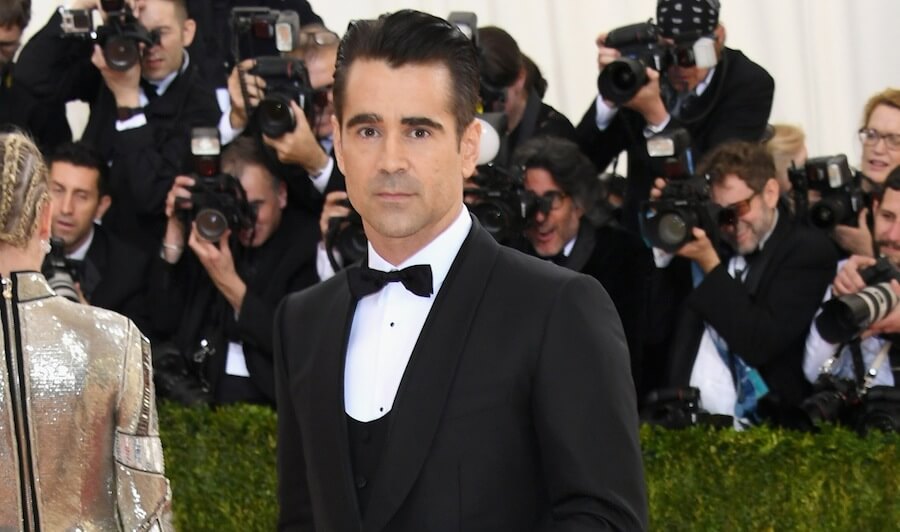Colin Farrell didn’t think “The Lobster” was weird. Sure, it concerns an alternate world in which single people are given 45 days to find a partner, and if they fail they’re turned into an animal (of their choice, charitably). But the actor had seen “Dogtooth.” That film, “Lobster” director Yorgos Lanthimos’ breakthrough, concerned three young adults raised on an isolated estate to believe elaborate and ridiculous lies about the outside world. Farrell and his fellow name actors (Rachel Weisz, John C. Reilly, Ben Whishaw, et al.) knew what they were getting into. RELATED: Interview: Sienna Miller would rather make crazy movies like “High-Rise” “You don’t come across writing that’s that specific, that imbued with whatever meaning you wish to interpret,” Farrell says of the film not being afraid to be difficult and strange and non-commercial. “I felt like it was us gladly stepping into his world rather than him extending himself into a world that promised international spoils.” Lanthimos, who so far has specialized in darkly funny films about people controlled by ridiculous systems, didn’t feel odd working with his first batch of famous faces. After all, they were already fans. “I don’t feel comfortable meeting actors without them having seen some of my work,” Lanthimos says. “There’s no point in getting along as friends and then them watching my films and going, ‘What the f— is this?’” Like “Dogtooth,” “The Lobster” throws viewers into a surreal world without immediately giving us our bearings, forcing us to piece together the rules as they’re gradually presented. Likewise, it doesn’t tell us what to think. It may seem to be a bromide against how we’re conditioned to pair off. But it’s less about having a simple go at relationships and more about forcing us to question notions like humanity’s willingness to surrender freedoms and the dark side of communities. RELATED: Ralph Fiennes defends his “A Bigger Splash” hellraiser “I know as a dad, you want your child to feel special — but not so special that they’re not part of a group. You don’t want your child to be alone,” Farrell explains. “You want them to find a collective of people they can belong to. But to what expense to the individual does belonging to a group compromise a person’s own truths? There’s a lot of stuff in the script and in the film about the choices we will subjugate in the name of staving off our own loneliness. “The system we live within and the rule of law we will completely become 100 percent complicit [in] can lead to our downfall — just for fear of rocking the boat, for fear of being outside the ‘human experience,’” Farrell adds. Asking these questions — rather than offering easy, soothing answers — was all part of Lanthimos’ plan. He’s even reluctant to talk about his own take on the film.
“I don’t like limiting [people’s reactions],” Lanthimos explains. “You start with a subject or a story and hopefully you make something that touches on many different subjects. Then people, with their own experiences and education, they see so many different things in it. For me to come in and say, ‘No, no, no, that’s not right’ — that’s the opposite of what we were trying to do.” In fact, he went in not always sure if even he knew what “The Lobster” was saying. “We might be able to see less than other people do,” Lanthimos says. “Whether it’s instinctive or unconscious, we put stuff in there that someone else can see much better than us. That’s the richness of it, not me analyzing my own work. That’s not creative.” RELATED: Interview: Jeremy Irons talks “The Man Who Knew Infinity” and fearing Trump “If there is such a thing as a piece of art being complete, once it’s presented to the outside world, it ceases to belong to the artist anymore. It belongs to the people,” Farrell says. The actor thinks Lanthimos’ films are even more open than that. “In his films nothing is presented as good or bad or better or worse,” Farrell says. “He seems to have created a cinema that lacks any sense of moralism. Which I love. It asks the audience to find their own very unique perspective.” “The Lobster,” Farrell points out, isn’t that far from truth. Society still teaches us to ostracize those who haven’t settled down. “You would be quarantined in Ireland in the ’70s if you were a 30-year-old woman and you didn’t have a partner,” he points out. “After shooting it I thought, of all the films I’ve done this is the one I’d love a bunch of film students to watch, and I’d sit on the side and listen to them,” Farrell adds. “I don’t think there’s any one message.”
Colin Farrell wants ‘The Lobster’ to make you think

Getty Images
Follow Matt Prigge on Twitter @mattprigge


















